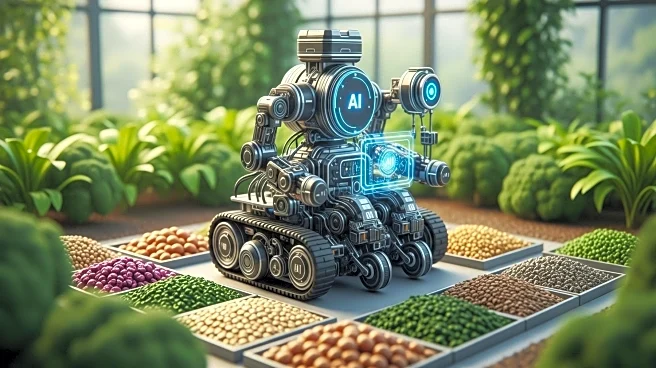What is the story about?
What's Happening?
Syngenta Vegetable Seeds has announced a collaboration with Heritable Agriculture to utilize artificial intelligence (AI) in optimizing vegetable seed placement. The partnership aims to leverage AI tools to analyze historical data, including geographical conditions and crop trials, to predict the best-performing seed varieties for different regions and climates. Matthew Johnston, Global Head of Vegetable Seeds and Flowers at Syngenta, emphasized the importance of planting the right seed for growers' success and highlighted AI's role in bringing innovation to agriculture. Heritable Agriculture, founded at Google X, will model interactions between genetics, soil, and weather conditions to forecast seed performance. This initiative is part of Syngenta's broader strategy to integrate AI across its operations, including the launch of Cropwise AI within its digital platform.
Why It's Important?
The collaboration between Syngenta and Heritable Agriculture represents a significant advancement in agricultural technology, potentially transforming how growers select and plant seeds. By using AI to analyze complex data sets, the initiative could lead to more efficient and productive farming practices, benefiting growers by providing them with tailored seed solutions for diverse environmental conditions. This approach may enhance crop yields and sustainability, addressing challenges posed by climate variability and resource constraints. The partnership also underscores the growing role of AI in agriculture, offering a model for other companies seeking to innovate in the sector.
What's Next?
As Syngenta and Heritable Agriculture implement AI-driven seed placement strategies, stakeholders in the agricultural industry may observe shifts in seed selection processes and crop management practices. The success of this collaboration could prompt further investments in AI technologies by other agricultural firms, potentially leading to broader adoption of AI in farming. Additionally, growers may need to adapt to new methodologies and tools provided by these advancements, requiring education and support to maximize the benefits of AI-driven solutions.
Beyond the Headlines
The use of AI in agriculture raises important ethical and legal considerations, particularly regarding data privacy and the potential for technology to disrupt traditional farming practices. As AI becomes more integrated into agriculture, stakeholders must address these issues to ensure equitable access to technology and protect the interests of small-scale farmers. Furthermore, the collaboration highlights the potential for AI to contribute to sustainable agriculture, offering solutions to environmental challenges and promoting responsible resource management.

















